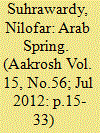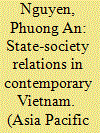| Srl | Item |
| 1 |
ID:
114333


|
|
|
| 2 |
ID:
147670


|
|
|
|
|
| Summary/Abstract |
The understanding of Angkorian pre-state society has been greatly enhanced by an increase in archaeological investigation in recent years. From excavations conducted at Cambodian Iron Age sites we have evidence that attests to a transformative period characterised by increasing sociopolitical complexity, intensified inter- and trans-regional mercantile activity, differential access to resources, social conflict, technological transfer and developments in site morphology. Among the growing corpus of Iron Age sites excavated, Phum Lovea, on the periphery of Angkor, is uniquely placed to provide insight into increasing sociopolitical complexity in this area. The site is one of the few prehistoric moated settlements known in Cambodia and the only one to date to have been excavated. Excavation of the site has revealed an Iron Age agrarian settlement whose occupants engaged in trade and exchange networks, craft specialisation, metal production, and emergent water management strategies. These attributes can be seen as antecedent to the profound developments that characterise the first millennium CE polity centred on Angkor.
|
|
|
|
|
|
|
|
|
|
|
|
|
|
|
|
| 3 |
ID:
075004


|
|
|
|
|
| Publication |
2006.
|
| Summary/Abstract |
This paper offers an analysis of the relations between youth and the socialist state in contemporary Vietnam, which sheds light on the wider state-society relations. Amid rapid social changes brought about by economic liberalisation, the Vietnamese Communist Party and socialist state may no longer be the sole driving force that motivates young people. As they seek to be both in control of and in touch with youth, the leaders of the Party and state find themselves negotiating between maintaining their ideological integrity and accommodating the changing needs and desires of youth. An analysis of recent events demonstrates that youth are no longer merely a subject of political propaganda and mass mobilisation, but instead they have evolved to become an important social actor urging the leadership to further reform itself. As young people express a desire to embrace socioeconomic and cultural changes wrought by processes of marketisation and globalisation, the Party and state are actively reforming themselves not only to respond to young people's desires and aspirations, but also to strengthen their political authority and leadership, and to consolidate their control and management of youth amid the new conditions of a market-oriented society. Overall, this paper sheds light on the changes in what is considered to be the 'strategic' relationship between the state and youth, and the wider process of sociopolitical transformation in present-day Vietnam.
|
|
|
|
|
|
|
|
|
|
|
|
|
|
|
|